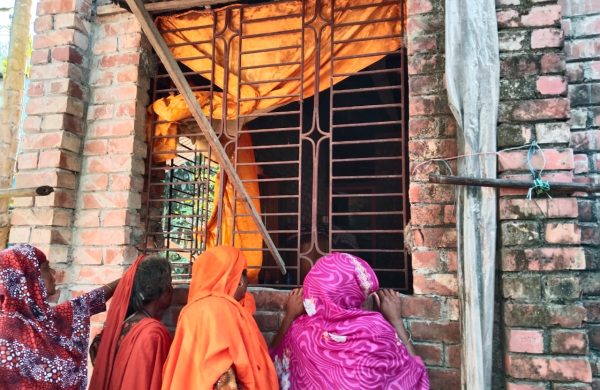The Mockery of Business Owners Continues
- Update Time : Saturday, July 5, 2025

—Mostofa Kamal—
Expecting increased industrial investment while leaving all the underlying causes of economic weakness unaddressed is yet another farce. As the industrial sector grapples with the crisis, domestic production and GDP growth are taking a direct hit—and this will only worsen. Factories are closing one after another, producing hundreds and thousands of new unemployed workers. If this trend continues, the economy will not just be on the brink of collapse—it will fall headlong into the abyss.
According to the World Bank’s latest Bangladesh Development Update report, nearly 3 million more people may fall below the poverty line in 2025. Yet the government’s narrative stands in stark contrast.
Dr Salehuddin Ahmed, Economic Adviser to the government, said that efforts are being made to revitalise business and trade, adding that the economy is not in a completely ruinous state. If so, then in what condition exactly is the economy? No clear answer has been provided. And if the situation isn’t bad, then why the rush to boost business activity? These are questions that businesspeople and investors cannot even raise aloud.
That’s another grim reality.
Even ordinary citizens can sense that although opportunities existed to reform the economic structure, they weren’t taken. Many factories, which once enjoyed state-sponsored privileges, were forced to shut down. Yet, no productive decisions have been made about them. The absence of any alternative support for the workers who lost their jobs is both inhumane and short-sighted.
The challenges facing the industrial sector are many—chief among them is the energy crisis. LNG imports have sharply increased production costs, leaving a negative impact on the economy. A weak banking sector has made it difficult for businesses to secure capital. These issues surrounding investment, energy, and banking did not emerge overnight. They are the result of long-standing irregularities and neglect, which have become more apparent after 5 August.
So far, the government has not treated this as a “top priority.” Had it done so, urgent steps would have been taken to restructure the economy, provide stimulus packages for industries, and rehabilitate workers. Acknowledging the problem is the first step to solving it. Yet, within sections of the government, there is a clear tendency to deny or deflect issues. Notably, blame-shifting is also common. The economic adviser claimed that the management of some institutions is at fault. But if that’s true, doesn’t the government have a responsibility to ensure that these are rectified?
Business and trade took a hit early in the last fiscal year due to the quota reform movement, political instability, and the student-led uprising. Law and order then deteriorated further, followed by widespread labour unrest over multifaceted demands. Later came the gas and power crises, high interest rates, inflation-induced reduced demand—all compounding the problems. We have yet to see the full extent of damage caused by the recent protests by National Board of Revenue (NBR) employees. The adviser hinted that future revenue collection could suffer. And so begins the new fiscal year—with fresh uncertainties and lingering old challenges.
Gas extraction from domestic fields is declining. No new fields are being discovered. Entrepreneurs fear that unless LNG imports are ramped up, the gas crisis will worsen.
Unless law and order improves, energy supplies stabilise, interest rates fall, and confidence is restored among businesses, the business landscape will soon descend into chaos. Once it collapses, even finding a wall to lean on will be difficult. If the election atmosphere is calm and positive, that’s one thing. But if uncertainty and tension rise, the investment climate will deteriorate further.
These concerns are backed by data. Provisional GDP growth for the outgoing 2024–25 fiscal year stands at 3.97%, down from 4.22% the previous year. Public and private investment has also fallen. Private investment accounted for 22.48% of GDP in the last fiscal year, down from 23.51%. Due to sluggish business, revenue collection also fell compared to the previous year. So where is the economy heading?
Anti-investment and anti-industrial activities remain unchecked. Extortion, corruption, and mob violence continue. Political stability and ending the culture of mob rule are essential to boost economic activity. The interim government achieved little beyond remittance growth. Not being able to build trust with businesses is a major failure. If domestic businesses are not confident, foreign investment will remain elusive.
Acting on IMF recommendations, the government has increased VAT and taxes on various goods and services, which is unlikely to yield positive results for the economy. Its attempt to curb inflation through higher interest rates has also failed. Meanwhile, businesses are losing competitiveness.
As a result, news of factory closures is surfacing almost daily—though many go unreported. Workers and employees weep and grieve, with little to do beyond cursing their fate. Many cannot even afford to pay rent. Markets are shutting down, and the economic impact is spreading to communities. These unemployed individuals are not sitting idle. But every factory closure brings immense destruction—not something only economists can perceive. Any conscientious person can sense this.
Had investment and business been kept outside politics, the situation might have been different. Even in Sri Lanka, despite political turmoil, factories were neither attacked nor closed. Jobs were preserved. The country overcame its crisis through effective business protection, cooperation, and reduced inflation—from 70% to 5%. Elections followed, leading to a democratic transition. Bangladesh, unfortunately, has taken the opposite path.
The only success in the financial sector has been remittance inflow. There has been no revolutionary, or even basic, improvement in financial, administrative, or revenue sectors. A proper understanding of investment, business, industry, and labour is crucial if the government hopes to address current challenges. Establishing financial discipline and macroeconomic stability will require facing the truth—free of political bias. Both the private and public sectors must play their roles.
Stagnant investment and rising unemployment are not just matters of economic management—they involve capital security as well. And the government cannot guarantee that alone. A jobless economy fuels unemployment. A growing portion of youth is neither employed nor in education or training. The number of long-term unemployed graduates is also increasing. These trends are causing widespread anxiety and hopelessness regarding the country’s economic prospects.
If the private sector—currently the backbone of employment—begins shedding jobs, it only adds to an already grim scenario. According to BBS data, government jobs account for only 3.8% of total employment, while 14.2% are in the private sector and nearly 61% in self-employment.
What awaits us next? Business owners are increasingly uncertain—worried about running factories, securing orders, purchasing raw materials, and affording utility bills. Even workers who are still employed live in fear. Meanwhile, the unemployed are unable to pay rent, or even afford basic necessities.
————————————————————————–
The writer is journalist and columnist; Deputy Head of News, Banglavision



















